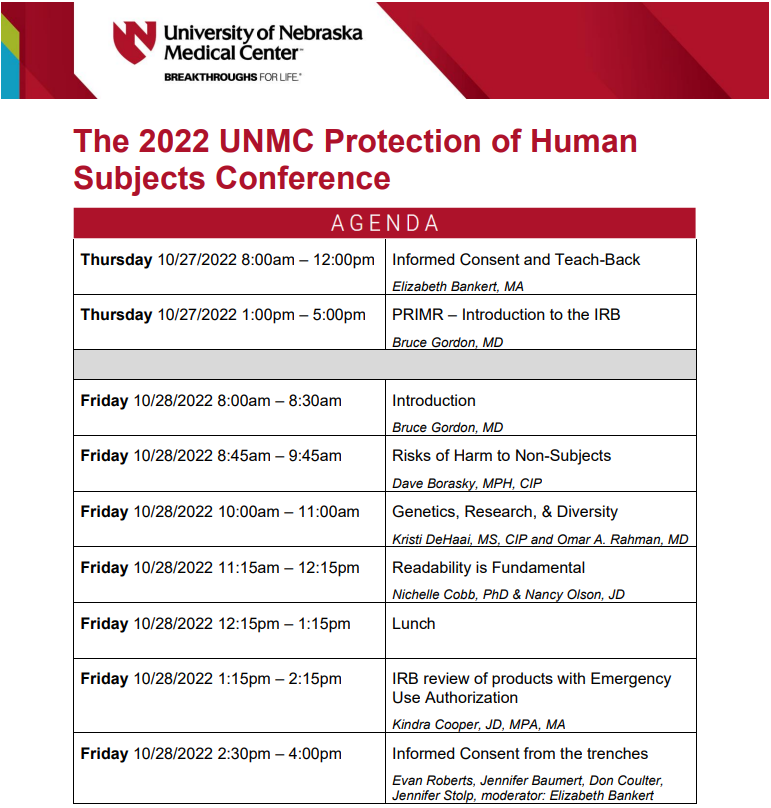
Our 2022 speakers:
|
|
Elizabeth Bankert, MALiz recently retired from Dartmouth College where she began her career in research administration in the Grants & Contracts Office in 1989. Liz was given the opportunity to be part of the IRB Office where she stayed for over 10 years. She then transferred to the Provost Office in a broader research compliance role, and finally returned as the Director of the IRB to complete her 30 years. Liz is a Past President of Applied Research Ethics National Association (ARENA) and received the ARENA Legacy Award in 2007. She was a member of the faculty for Public Responsibility in Medicine & Research (PRIM&R) and a member of the Secretary of Health Advisory Committee for Human Research Protections (SACHRP). Liz is co-editor of the books entitled: IRB: Management and Function and the IRB Member Handbook. Liz continues to present on the use of ‘teach-back’ as a method to improve communications in the consent process. |
 |
David Borasky, MPHDavid serves as Vice President of IRB Compliance with WCG Clinical. In this position he is responsible for leading quality and compliance efforts for WCG IRB. He has over 25 years of experience managing institutional review boards in a variety of settings including research institutes, global health organizations, academic medical center and independent IRB organizations. He has served as a consultant for the Office of Human Research Protections, the US Department of Energy, the World Health Organization and numerous other institutions. David is a former member of the PRIM&R Board of Directors and in 2018 was named a Distinguished Leader of PRIM&R. He currently serves as Co-Chair of the Subpart A Subcommittee of the HHS Secretary’s Advisory Committee on Human Research Protections. |
 |
Nichelle Cobb, PhDNichelle is the Senior Advisor for Strategic Initiatives for the Association for the Accreditation of Human Research Protection Programs (AAHRPP) and previously a site visitor for AAHRPP and member of AAHRPP’s Council on Accreditation. Prior to joining AAHRPP, she was the Director of the Health Sciences Institutional Review Boards (IRBs) for 16 years at the University of Wisconsin-Madison and has worked with IRBs for 20+ years. Nichelle has been involved in single IRB work for more than a decade and was instrumental in the development of the SMART IRB Master Reliance Agreement and serves as a Senior Advisor and Ambassador for SMART IRB, a federally funded project that supports the implementation of single IRB. In addition, Nichelle is a member of the SMART IRB Harmonization Steering Committee and has co-led working groups to harmonize IRB and Human Research Protection Program (HRPP) practices, such as for reportable events, ancillary reviews, continuing review, and local context. Nichelle also has been a member and co-chair of the Workshop and Didactic Subcommittee for the Public Responsibility in Medicine and Research (PRIM&R) annual Advancing Ethics in Research Conference, contributed to IRB Management and Function, 3rd Edition, authored academic articles on single IRB and informed consent, and developed and taught PRIM&R courses for new IRB administrators and about the Common Rule. |
 |
Kindra Cooper, JD, MPA, MAKindra is an Associate Clinical Professor in the Department of Medical Humanities at Creighton University, where she also serves as the Director of the IRB. As IRB Director, she is responsible for oversight of Creighton University’s Human Research Protection Program and two institutional review boards (Biomedical and Social/Behavioral). Kindra is a regulatory and life sciences attorney by training. She earned her JD at the University of Washington School of Law. She also holds a Master of Bioethics and Health Policy from Loyola University Chicago and a Master of Public Administration from The George Washington University. Prior to her role at Creighton Kindra previously served as an IRB Chairperson for Advarra and as a Senior Regulatory Attorney for Quorum IRB. She is an AAHRPP site visitor in training and a member of The Consortium to Advance Effective Research Ethics Oversight (AEREO). She is a published author on topics including eConsent and mobile medical applications. She has presented at national conferences and via online webinars on topics including IRB Myths, eConsent, remote consent, IRB review of medical device research, and considerations for the use of remote technology in clinical trials. Kindra’s research interests include the history of human subjects research oversight, narrative medicine, and end of life narrative. |
 |
Bruce Gordon, MDBruce is UNMC's Assistant Vice Chancellor for Regulatory Affairs and a Professor of Pediatrics in the section of Pediatric Hematology/Oncology and Stem Cell Transplantation at the UNMC. Dr. Gordon has been a member of the UNMC Institutional Review Board since 1992 and served as Chair since 1996, and Executive Chair since 2011. He organized and is first Chair of a Joint Pediatric IRB with the Children's Hospital and Medical Center in Omaha. He has served on a variety of national committees and task forces (including the DHHS Secretary's Advisory Committee on Human Research Protections Subpart A subcommittee) and served as the first chairman of the National Cancer Institute Pediatric Central IRB. He has been faculty at PRIM&R regional and national meetings, served as the co-chair for the 2009 PRIM&R national conference, and is the author of numerous original papers, review articles and abstracts regarding human subjects protection and research ethics. |
 |
Omar Abdul-Rahman, MDThe current Director of the Department of Genetic Medicine and Friedland Professor at the UNMC Munroe-Meyer Institute, Omar Rahman, MD formerly served as Division Director for Medical Genetics and Vice Chair for Faculty Development in the Department of Pediatrics at the University of Mississippi Medical Center (UMMC). He also was the founding director of UMMC’s Center of Genetic Medicine. Dr. Rahman’s practice is focused primarily on adult and pediatric patients in a general genetics clinic as well as inpatient consults for pediatrics, prenatal, and adult genetics. He also has participated in the teaching of genetics to the first-year medical school class with a focus on genetic principles, common genetic conditions, and pharmacogenetics. Dr. Rahman’s background and research interests lie in developing new approaches to systematically capture phenotypic information relevant to clinical genetics, as well as applying that information in the context of molecular genetics and genomics so as to reach a mechanistic and diagnostic understanding of health and human disease. He has a particular focus on Fetal Alcohol Spectrum Disorder (FASD). |
 |
Kristi DeHaai, MSKristi is an IRB Analyst in the Office of Regulatory Affairs at the University of Nebraska medical Center (UNMC). She has been a member of the UNMC IRB since 2013, where she currently specializes in single IRB review and oversight. Kristi served as the Pediatric IRB Administrator from 2013 to 2018. Prior to her work with the IRB, Kristi worked in the department of Genetic Medicine at Munroe-Meyer Institute at UNMC. Kristi has been a member of the Nebraska Medicine Hospital Ethics Committee since 2020 and is the Chair of the Ethics sub-committee on policy. She has a master’s degree in the Medical Sciences Interdisciplinary Area (MSIA) with a focus in genetics and behavior and has authored a chapter in the 3rd edition of “IRB: Management and Function”. |


